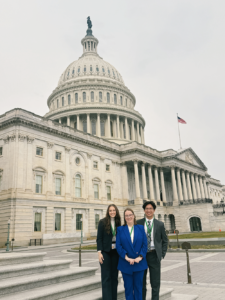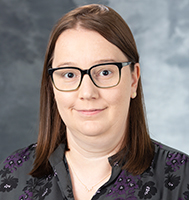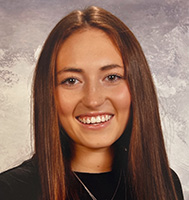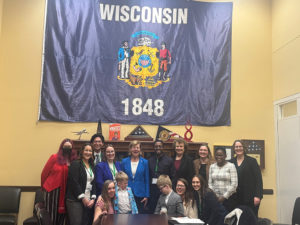
February 25 through 28 marked Rare Disease Week on Capitol Hill in Washington, D.C. Hosted by Rare Disease Legislative Advocates, a program of the EveryLife Foundation for Rare Diseases, it is a weeklong event that invites rare disease advocates from across the country to come to talk to their congressional representatives and senators. Bryn Webb, MD, associate professor, Division of Genetics and Metabolism, and two research specialists — both recent UW–Madison graduates — also from the division, Norman Liu and Sophia Salemi, traveled to the event to advocate for important policy changes and reforms relating to rare diseases.
A rare disease is defined by the FDA as a disease or condition that affects fewer than 200,000 people in the United States. Although each disease is rare, in the aggregate rare diseases are common, affecting 30 million Americans.

The Webb Research Group is dedicated to advancing understanding of the genetics and pathophysiology of rare Mendelian disorders. Webb’s specific focus is on investigating the cases of patients with undiagnosed but suspected genetic diseases. Webb has thus far identified eight novel genetic disorders and has used mouse and stem cell models in her investigations.
Liu plans to pursue a career as a physician-scientist in clinical genetics. Salemi intends to become a genetic counselor and is one of three Young Adult Rare Representatives for Wisconsin. Both received travel scholarships to attend Rare Disease Week from EveryLife Foundation for Rare Diseases.
Webb, Liu, and Salemi held meetings with the offices of Representatives Mark Pocan (WI-02) and Bryan Steil (WI-01), and of Senators Tammy Baldwin and Ron Johnson about a number of legislative issues relevant to rare diseases. Through the group’s advocacy efforts, Representative Steil agreed to join the rare disease congressional caucus.


Liu advocated for the reauthorization of the Pediatric Priority Review Voucher. This legislation expedites the review process for new drug applications or biological license applications with the FDA. It facilitates faster access to potentially life-saving treatments for children with rare diseases. Since its inception in 2006, the Pediatric Priority Review Voucher program has awarded 46 vouchers for 35 different rare pediatric diseases, representing tangible progress fighting these often-devastating conditions.

Salemi advocated for the formation of an Interagency Coordinating Committee for Rare Diseases. Sharing her own story of her rare metabolic disease, as well as her experiences as a rare disease research specialist, Salemi explained how an Interagency Coordinating Committee for Rare Diseases could serve as a vital resource. Such a committee would bring together stakeholders from diverse federal agencies to address the unique needs of people living with rare diseases. It could include increasing access to specialized care, speeding diagnoses, generating research funding, and improving development of therapies and educational resources for families. This group would consist of patients, caregivers, clinicians and other providers, researchers, rare disease organizations, federal agencies such as the NIH and FDA, and others.
Reflecting on the week, Webb noted: “Advocacy is not just about bringing attention to the individual struggles of those with rare diseases, it is about driving systemic change. It is about promoting policies that can improve the lives of millions who face these challenges daily. By joining forces with others during events like Rare Disease Week, we create a stronger collective voice that resonates with policymakers and urges them to prioritize the needs of the rare disease community.”